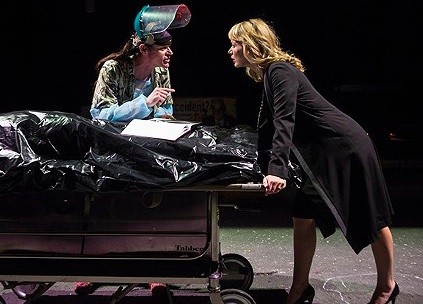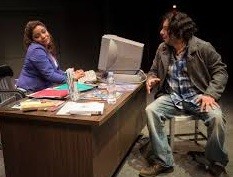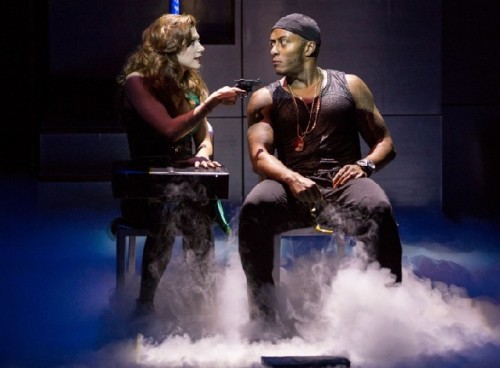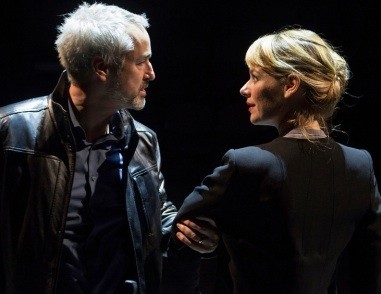Big Lake Big City at Lookingglass in Chicago
Theater Noir by Keith Huff Thrills
By: Susan Hall - Jul 21, 2013
Big Lake Big City
By Keith Huff
Drected by David Schwimmer
Lookingglass Theatre
Chicago, Illinois
Runs thru August 25
Thomas J. Cox (Divot and others), Anthony Fleming III (Moss and others), Philip R. Smith (Bass Podaris), Kareem Bandealy (Peter and others), Katherine Cunningham (Ally), Danny Goldring (Getz), Beth Lacke (Susan), Eddie Martinez (Stewart), J. Salome Martinez (Trent and others) and Wendy Mateo (Maria).
Sibyl Wickersheimer (scenic), Ana Kuzmanic (costumes), artistic associate Christine A. Binder (lighting), artistic associate Rick Sims (sound/composition) and Maria DeFabo (props). Narda E. Alcorn is the production stage manager, and Tess Golden is the assistant stage manager.
True stories about Chicago abound. In his homage to the city, Chicagoan Keith Huff weaves together three stories. A cop played brilliantly by Philip R. Smith, has gone wild. He is diagnosed with “Optorectalitis,” a serious vision impairment caused by having one’s head firmly entrenched up one’s ass.
The diagnosing psychiatrist, Beth Lacke in a wicked turn, works at the morgue. She is so attractive that she appears on Fox news frequently. She is in a marriage of convenience, although it is difficult to tell what is convenient about it for her.
Stew and Maria are going to Disneyworld where the screwdriver that sticks out of Stew’s head will not seem odd. Playwright Huff found this story in a book about Chicago cops. “My partner and I were driving one night, a guy flagged us down. He had a knife sticking out of the top of his head. All we could see was the hilt coming out. ‘Somebody stabbed me.’ ‘Okay, get in, we’ll take you to the hospital.’ He sat in the back of the squad: he had to keep his head tilted so he wouldn’t hit the car roof. The amazing thing was, he was talking away, laughing, joking, didn’t seem to hurt him at all. [At the hospital] we ask one of the docs, ‘Is he gonna make it?’ The doc said, ‘The minute they take it out, he’s dead. I don’t know, I’d keep it in. Get a good barber."
These things happen in Chicago. Eddie Martinez playing Stew makes you a believer.
At the play’s opening, a spot light focuses on a Modigliani sculpture of a head. Heads in all forms are the focus of Big Lake Big City. Detective Podaris’ head has become unscrewed, Stew’s head screwed with a driver, and Dr. Susan’s head stolen.
The play is a head job, yet curiously moving. Maria, a travel agent, has been to Disneyworld nine times and wants to get married there with Mickey and Goofy in attendance. She is delightful. Detective Podaris, a shattered man, draws us in as he goes lost. Ally his errant wife is touching in her prideful need to dispense any idea that she is an alley whore.
What strikes immediately, and is also spotlighted in the production, is Huff’s debt to Dashiel Hammett, the Maltese Falcon and the great turns of phrase of the grandpa of the Cubs GM wrote in the script for Casablanca. A phrase begins in one state of mind and ends in another. An emotion is u-turned in less than a second.
This kind of line or phrase is difficult to deliver, but you would not know it watching the play. The actors report the problems with the mental and emotional switchbacks and how much work it takes to create the humor and pathos of their characters. So their success is a mark of great talent – in the performances and in the direction by David Schwimmer.
The title of the play also recalls Jay McInerney’s Big Lights Big City about the dark side of New York. And surely we are on the dark side of Chicago at the Lookingglass. But not without continuous eruptions of humor.
They come from these rapid turns of phrase, emotional switchbacks, echoes of phrases past and especially from their rendering by this talented band of actors.
Schwimmer has taken advantage of all the action and visual opportunities the playwright offers up. The big Navy Pier Ferris wheel sits in miniature on a cop’s desk. The play ends in one of its cabs. Fog rolling in from Lake Michigan envelops the stage. The construction crew that Stew’s brother works on moves props and furniture seamlessly.
Two noir tarts are in super spikes, but never totter. Ally is only perturbed when she is called a prostitute. Katherine Cunningham creates Ally's multiple personas turning on a dime. As we weave through the show, Ally turns out to have a relationship with every male who shows up. And a job to match. Money turns out to be her end goal. So what would she call herself?
Yuck moments at first shock. While they at first distance the audience, you get used to the screwdriver driven into Stew’s skull and periodontal work which causes yelps. We are at a primal level. Chicago is too.
No more than any other big city however. But in its own style. The city’s brass do things their own way, not as written in the law books. This serves to remind us that our current President was better prepared for political life than is sometimes apparent: he was tutored at Chicago Mayor Daley’s knee. And in the funny house mirror that reflects law enforcement and the criminals, we all share mixed character, part good, part bad.
The ending at first teases Jay McInerney as Stew says, "Do you want to get/go high?" McInerney "You get down on your knees and tear open the bag. The smell of warm dough envelops you. The first bite sticks in your throat and you almost gag. You will have to go slowly. You will have to learn everything all over again."
But high in Chicago turns out to be atop the Ferris wheel on Navy Pier where all the world seems as one. From this perspective differences between us merge into nothing.
For the actors at Lookingglass, this redemptive moment is critical. But it is not slammed home. Like everything else in the Huff play, it is taken on a pleasureful reverse of expectation. The characters are not going to drown themselves in coke, but rather learn everything all over again. Whatever lessons audiences absorb from the play are delivered by gifted actors with a light, humorus noir touch.





